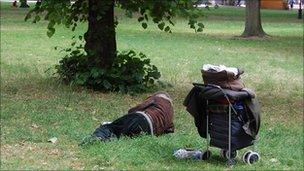Failed asylum seekers 'neglected' by system, Oxfam says
- Published

Some asylum seekers rely on friends for a place to sleep, others sleep rough
Thousands of failed asylum seekers are living in the UK with no income or safe place to sleep, the charity Oxfam says.
It found many who had appealed over their failed cases lived hand-to-mouth, sometimes developing mental health problems or turning to the sex trade.
It said those refused asylum were shown no compassion and urged ministers to improve the decision-making process and make all support payments in cash.
The UK Border Agency acknowledged the process could be improved.
It added that no asylum seeker needed to be destitute while they had a valid reason to be in the UK, but funding those without one might encourage them to stay.
Oxfam's research, carried out with a team at Swansea University, found many asylum seekers lost cases because they had no access to legal advice or did not speak English.
The report painted a bleak picture of the life of a failed asylum seeker in the UK.
It said many were dependent on others to let them sleep on their floors or share a hot meal.
Others ended up sleeping rough and resorted to cash-in-hand work or got into abusive relationships or sex work to survive, it said.
The true number of failed asylum seekers on the UK's streets is not known, according to Oxfam.
It said the Red Cross provided emergency assistance to 11,600 asylum seekers in 2009, most of whom were failed applicants. But it suggested the most recent official figures were between 155,000 and 283,500.
Currently, asylum seekers normally receive government accommodation and £35.52 a week.
Failed asylum seekers are entitled to so-called section 4 support - accommodation and a non-cash payment of £35.39 a week, topped up on a payment card valid in limited shops.
This support is conditional on the recipient agreeing to return home as soon as the UK government thinks it is safe for them to do so.
But Oxfam said many did not apply for the support because they thought they had been wrongly denied asylum.
It pointed to figures showing nearly a third of initial asylum decisions were overturned on appeal.
'Living like ghosts'
Kate Wareing, Oxfam's director for poverty in the UK, said: "These are people who have made heartbreaking decisions to leave their families and flee their homes.
"They end up living as ghosts on the streets of Britain because of government policy and decision-making that strips them of their rights and dignity.
"The current system is designed to make people feel as low as possible and sends out a message that those who are refused asylum are not even worthy of our compassion."
Oxfam said failed asylum seekers should get cash-based support - without conditions - until they were granted permission to stay, left voluntarily or were removed.
It argued this would allow them to buy what they needed and would put them in regular contact with authorities, meaning they would be closer to help from the government or voluntary organisations.
It said it also wanted asylum decisions to be improved, arguing asylum seekers would have more faith in the system and the government could save itself £13.5m in administrative and support costs.
Frustrate the system
Hugh Ind, UK Border Agency regional director, said: "We do provide financial support while claims are being dealt with, and no asylum seeker need be destitute while they have a valid reason to be here.
"But we strongly believe that funding those who we have found not to be in need of protection would act as an incentive to frustrate the system and stay in the UK.
"We are committed to ensuring asylum cases are concluded faster, at lower cost, and we continue to improve the quality of our decision making."
A UK Border Agency spokesman added that a project had been set up aimed at increasing productivity and speeding up the processing of applications.
He added that the agency was confident the system for failed asylum seekers to buy food and toiletries, known as the Azure card, was a success as more than one million transactions had been made in 8,800 UK stores including Tesco, Sainsbury's and Boots.
- Published4 February 2011
- Published16 December 2010
- Published22 November 2010